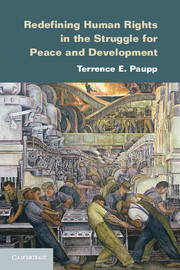Book contents
- Frontmatter
- Dedication
- Contents
- List of Tables
- Foreword
- Acknowledgments
- Introduction
- 1 The greatest undiagnosed problem in international law
- 2 From disparity to centrality: How the human rights to peace and development can be secured
- 3 Confronting structural injustice: Strategies of localization, regionalism, and an emerging global constitutional order
- 4 The power of law versus the law of power: How human rights can overcome inequality, poverty, and vested interests
- 5 A world community that includes all human communities: Indigenous communities and the global environment as sources for human rights claims
- 6 Actualizing the human right to peace: Paths for developing processes and creating conditions for peace
- Conclusion Transformation through cooperation: Implementing a human rights–based approach to human security
- Biography of Terrence E. Paupp
- Appendix 1 Principles Relating to the Status of National Institutions (The Paris Principles)
- Appendix 2 Tilburg Guiding Principles on World Bank, IMF, and Human Rights
- Appendix 3 Universal Declaration of the Rights of Peoples (Algiers, 4 July 1976)
- Appendix 4 The Freedom Charter (Africa, 1955)
- Index
- References
1 - The greatest undiagnosed problem in international law
Published online by Cambridge University Press: 05 June 2014
- Frontmatter
- Dedication
- Contents
- List of Tables
- Foreword
- Acknowledgments
- Introduction
- 1 The greatest undiagnosed problem in international law
- 2 From disparity to centrality: How the human rights to peace and development can be secured
- 3 Confronting structural injustice: Strategies of localization, regionalism, and an emerging global constitutional order
- 4 The power of law versus the law of power: How human rights can overcome inequality, poverty, and vested interests
- 5 A world community that includes all human communities: Indigenous communities and the global environment as sources for human rights claims
- 6 Actualizing the human right to peace: Paths for developing processes and creating conditions for peace
- Conclusion Transformation through cooperation: Implementing a human rights–based approach to human security
- Biography of Terrence E. Paupp
- Appendix 1 Principles Relating to the Status of National Institutions (The Paris Principles)
- Appendix 2 Tilburg Guiding Principles on World Bank, IMF, and Human Rights
- Appendix 3 Universal Declaration of the Rights of Peoples (Algiers, 4 July 1976)
- Appendix 4 The Freedom Charter (Africa, 1955)
- Index
- References
Summary
The greatest undiagnosed problem in international law in the early twenty-first century is the global importance, centrality, and nature of the yet-to-be fully articulated human right to peace and its twin, the human right to development. No nation on Earth is left unaffected or unharmed by the reality. The need to balance peace and security, on the one hand, with broad and comprehensive approaches to the task of development, on the other, constitutes a tremendous challenge under any set of conditions. However, the task and the challenge of managing these two enterprises is compounded exponentially when the criteria of human rights is ignored, violated, debased, or left unrealized and undefined.
This global reality affects the entire continuum of nations from a superpower such as the United States to the “fragile states” caught up in conflict, emerging from conflict, and mired in poverty, state-failure, socioeconomic collapse, and the threat of continued internecine civil war and terminal financial crisis. In between the superpowers and the fragile states are other states that are merging into new regional arrangements. The process of regionalization is remaking the map of global power and global relations. From the Association of Southeast Asian Nations (ASEAN) to Latin America (MERCOSUR, with its four member states: Argentina, Brazil, Paraguay and Uruguay), as well as the Organization of American States (OAS), from the African Union (AU) to the Southern African Development Community (SADC), as well as the Economic Community of West African States (ECOWAS), from the European Union (EU) to the League of Arab States (LAS), and from the outreach of Russia and China entering into new investment and trade arrangements in these regions and rewriting the rules that govern global trade under the World Trade Organization (WTO), the process of regionalization is remaking the map of global power and global relations.
- Type
- Chapter
- Information
- Publisher: Cambridge University PressPrint publication year: 2014

